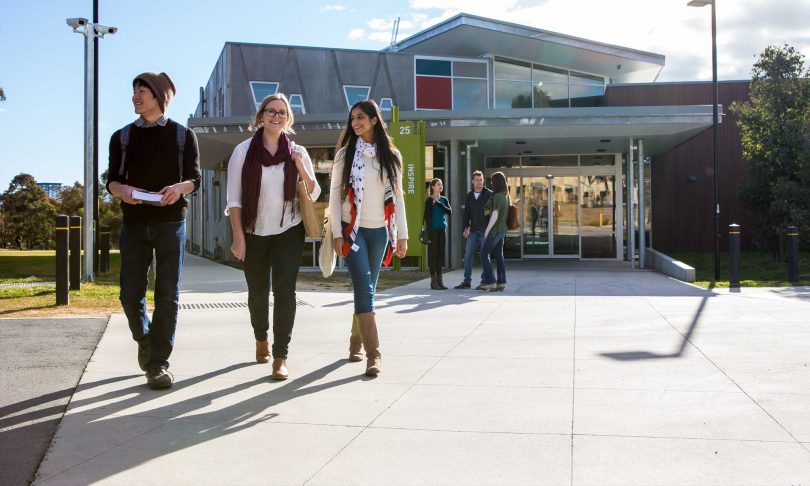
The University of Canberra has rocketed up the Times Higher Education global university rankings. Photo: File.
Over a million dollars is being invested in rural sustainability, privacy for personal devices and robotic empathy by the University of Canberra as it continues to fund new research projects after a huge jump in the global university rankings.
Three professors have received a combined total of $1.2 million through the Discovery Early Career Researcher Awards (DECRA) as the university aims to attract the best and brightest researchers from all over the globe.
Deputy Vice-Chancellor of Research and Innovation Leigh Sullivan says the university isn’t resting on its recent successes.
“The University of Canberra’s research performance has gone from strength-to-strength, seeing the university rocket up the rankings to be in the Top 200 in the world according to the influential Times Higher Education global university rankings,” Ms Sullivan said.
“This acknowledgement of the outstanding research that not one, but three early-career academics are doing in the areas of education, engineering and robotics is a testament to the dedication of these researchers to pursue innovative, future-forward research at the University.”
Associate Professor in the Faculty of Education Dr Philip Roberts is using the grant to research and understand how local knowledge in rural, regional and remote communities can enhance education in the cities and a state’s school curriculums.
Looking at data from six rural and remote schools, Dr Roberts aims to understand how we can better tailor knowledge to increase the educational outcomes of these communities.
“It’s fantastic validation for the research community and provides me with the time and money for research over the next three years. It’s a rare opportunity to focus on these issues in such detail,” Dr Roberts says.
“We will be going to rural communities and holding a number of meetings about what they value in education, and how they can relate to subjects they study at school.”
Coming from a teaching background, Dr Roberts says that curriculums are mostly city-centric and focus on experiences from children in major cities, ignoring knowledge that rural communities consider important.
“I talk to kids in the country and they say ‘this doesn’t relate to my world’, they can’t see the connection,” he says.
“Country kids are saying ‘why are we studying this?’ They aren’t choosing STEM subjects, which are important for future work opportunities, because they don’t think it relates to their future jobs but it does. Drones, tractors, all this technology, we need to help make these connections evident to these kids.”
Meanwhile, Assistant Professor Dr Mohammad Abualsheikh’s project will aim to increase the digital privacy of individuals by developing systems that can prevent and protect against cyber-attacks.
“The Australian Research Council DECRA will provide me with a great opportunity to expand on this valuable research,” he says.
Assistant Professor Dr Munawar Hayat will be working on giving robots feelings of empathy so they can better understand verbal and non-verbal cues in people. With robots becoming more intuitive, Dr Hayat believes that better social and emotional understanding is needed for them to be able to help people more in areas like rehabilitation, healthcare and education.
Original Article published by Dominic Giannini on The RiotACT.








